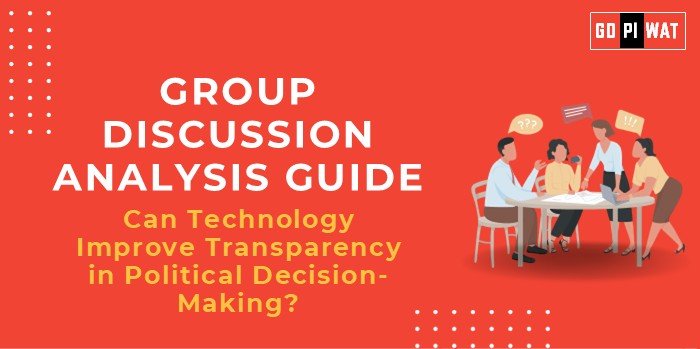📋 Group Discussion Analysis Guide
Topic: Can Technology Improve Transparency in Political Decision-Making?
🌐 Introduction
Context Setting
In a world increasingly defined by data-driven decision-making, technology is reshaping the landscape of political transparency. The potential for tech-driven e-governance to increase accountability, reduce corruption, and empower citizens is immense, making this an important topic for debate.
Background
The integration of technologies like blockchain, AI, and digital platforms in governance systems aims to bridge gaps between governments and citizens. From Denmark’s top-tier digital governance ranking to India’s ongoing efforts, the global landscape shows varying degrees of success in leveraging technology for transparency.
📊 Quick Facts and Key Statistics
- 🌍 Global E-Governance Leader: Denmark ranks #1 on the EGDI in 2024, scoring 0.9847 for its advanced digital governance.
- 🇮🇳 India’s E-Governance Rank: India ranks 97th with a score of 0.6678, reflecting steady but incomplete progress.
- 🔗 Blockchain in Governance: Estonia’s blockchain use saves 2% of GDP annually, boosting public trust.
- 📈 Corruption Perceptions Index: Nations with robust e-governance like New Zealand lead in transparency rankings, showing the correlation between technology and reduced corruption.
👥 Stakeholders and Their Roles
- Government: Implement and regulate technology-driven policies.
- Tech Companies: Provide solutions like blockchain, AI, and secure data systems.
- NGOs and Civil Society: Advocate for inclusivity and monitor progress.
- Citizens: Participate actively in e-platforms to hold governments accountable.
🏆 Achievements and Challenges
Achievements
- 📌 Denmark’s Leadership: High EGDI score showcases successful integration of digital tools in governance.
- 💡 Estonia’s Blockchain Success: Annual cost savings of 2% of GDP demonstrate efficiency and trust.
- 🇮🇳 India’s UPI Model: Adoption of platforms like MyGov highlights strides in transparency through digital payments.
Challenges
- 🌐 Digital Divide: India’s rural internet penetration is only 20%, limiting outreach.
- 🔒 Cybersecurity Risks: Threats such as the AIIMS cyberattack in 2022 emphasize the need for robust digital infrastructure.
- 📉 Global Disparities: India’s rank (97th) on EGDI reflects a need for policy enhancement compared to leading nations.
🚀 Effective Discussion Approaches
Opening Techniques
- Data Start: “Denmark’s top EGDI rank shows the transformative potential of technology, whereas India’s position at 97 highlights areas for improvement.”
- Case Study: “Estonia saves 2% of its GDP annually through blockchain, a lesson for others seeking transparency.”
Counter-Argument Handling
- Respond to digital divide concerns by citing innovative low-cost mobile solutions in Africa.
- Counter cybersecurity risks with advancements in quantum encryption technologies.
📈 Strategic Analysis of Strengths and Weaknesses
Strengths
- Enables cost-efficient governance (e.g., Estonia’s GDP savings).
- Reduces corruption through transparent data systems.
Weaknesses
- Requires robust cybersecurity frameworks.
- Faces resistance in traditional bureaucratic systems.
Opportunities
- Integrate AI for predictive governance.
- Collaborate internationally on digital governance best practices.
Threats
- Data breaches undermine trust.
- Digital exclusion in underdeveloped regions.
🗨️ Structured Arguments for Discussion
- Supporting Stance: “Blockchain has the potential to make political decision-making tamper-proof, ensuring transparency.”
- Opposing Stance: “The lack of digital literacy in rural areas limits the impact of technology-driven solutions.”
- Balanced Perspective: “While technology offers tools for transparency, addressing inclusion and security challenges is critical for success.”
🎓 Connecting with B-School Applications
- Real-World Applications: Use case studies like Estonia’s blockchain implementation for academic projects.
- Sample Interview Questions:
- “How can India replicate Denmark’s success in digital governance?”
- “What role does cybersecurity play in e-governance?”
- Insights for Students: Explore internships with policy think tanks or global tech companies focusing on governance.


